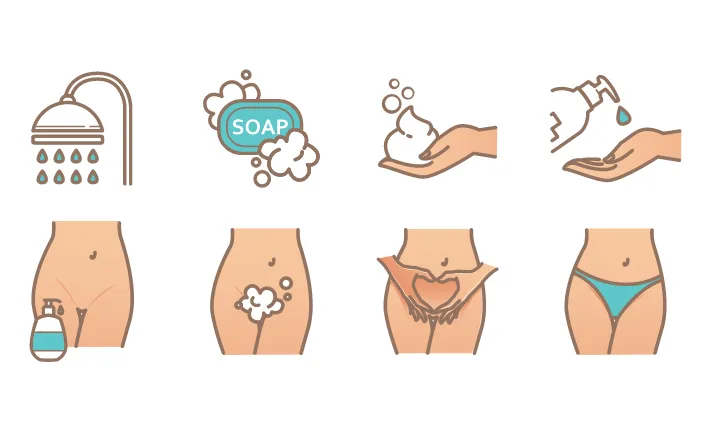Vaginal Discharge: All You Need to Know

What is Vaginal Discharge?
Vaginal discharge is the fluid secreted by your vagina and cervix's small glands. Vaginal discharge is a broad term that comprises any non-period-related fluid secreted from your vagina. It includes arousal fluid, natural vaginal lubrication, and cervical fluid (also called cervical mucus.) While normal or regular discharge is an indicator of a healthy body, women often experience heavy or excessive vaginal discharge.

Vaginal discharge is the fluid secreted by your vagina and cervix's small glands.
Why Do You Get Excessive Vaginal Discharge?
It is completely normal to get excessive vaginal discharge. However, it's important to understand the reasons why you get it, which can help you identify any underlying issues. There can be numerous reasons why you are having a heavy vaginal discharge. Here are some of them:

Ovulation
During ovulation and the days leading up to ovulation, the cervical fluid appears clear and slippery. The consistency resembles that of raw egg whites. Not just the consistency, the fluid amount too increases during this period.Arousal
Whenever you feel aroused, you will notice that the discharge is clear, watery, and slippery. This is because when you're aroused, the blood flow to the genitals increases, causing the blood vessels to enlarge and push the fluid to the walls of the vagina. This fluid also acts as a lubricant for the vagina during sexual intercourse.Stress or Hormonal Imbalance
Stress can create hormonal imbalances in your body, which can lead to an increase in vaginal discharge.You're on Antibiotics
The balance of bacteria in your vagina can be disturbed if you're consuming antibiotics due to any illness. This could lead to an infection, which causes a discharge that has a watery or cottage cheese-like consistency.Allergic Reaction
Allergic reactions due to use of douches, cleansers, sex toys, or even toilet paper can cause excessive and unusual discharge.Early Pregnancy
In the early stages of pregnancy, your body protects the growing foetus from infections that can reach the uterus from the vagina by secreting more-than-usual vaginal discharge. It is typically watery and slippery or white. Vaginal discharge does not have a particular colour or consistency. There are different discharge colours and consistencies, each indicating different phases of your menstrual cycle.Various Discharge Colours and What They Mean
Here's a list of the different discharge colours and what they mean:

Red Discharge
Your discharge is of this colour at the beginning of your menstrual cycle i.e. when you're on your periods.White Discharge
You have white discharge when your period is over. You may even notice lesser discharge than usual during this period. The shade in this phase can range anywhere from white to cream or light yellow.Clear Discharge
In the period before ovulation, you will notice clear discharge. It is characterised by its thin and slippery texture, and resembles the consistency of egg whites. You may also have clear, slippery discharge when aroused or during pregnancy.Pink Discharge
During the last few days of your menstrual cycle, you might notice that the discharge is of a pinkish hue. It is due to 'spotting' before you get your next period. Some people notice a pink discharge after ovulation when they've spotted a little, and at times it could be due to 'implantation spotting' in early pregnancy.Here are some discharge shades that should immediately set off alarms:
Grey Discharge
This is not a good sign. Grey vaginal discharge could be a symptom of a common bacterial infection called bacterial vaginosis. Its other symptoms include itching, irritation, strong odour, and redness around the vulva. In this case, you must see the doctor immediately.Yellowish-green Discharge
Dark yellow, yellowish-green, or green shades of discharge are usually a sign of bacterial or a sexually transmitted infection. If you notice this discharge, you should consult a doctor.When to Seek Help
You must immediately see a doctor if you experience any of the below symptoms, as they may be signs of a bigger concern: - If you notice yellow, green, or grey mucus or vaginal discharge - Experience itching or burning sensation - If you notice any unusual or foul odours - If you notice redness or swellingNow that you're aware of the reasons for excessive discharge and its various colours and consistencies, you should understand how to manage vaginal discharge efficiently to keep the intimate area clean and free from any infections.
Managing Vaginal Discharge Using Panty Liners
Panty liners are an integral part of intimate hygiene, and most women wear them daily to keep wetness caused by excessive discharge at bay. However, some women prefer using them only when they feel the need for them due to an unusual amount of vaginal discharge. Either way, it is undoubtedly one of the best ways to manage your vaginal discharge at any point during your non-period days. Here's why:

Sweat Absorbency
Panty liners can help absorb sweat as well as the uncontrollable discharge you experience during your ovulation days. Try the Always Extra Protect panty liners for days when you notice excessive discharge and need that extra protection. Reliable and fast-absorbing, you can trust the Always Extra Protect panty liners for daily use to feel fresh all day long.
Stay Prepared
Panty liners can also keep you prepared for your period. Wearing a panty liner will avoid leakage and save you from the anxiety of whether you've stained your clothes when you get your period unexpectedly.Apt to Use After a Period
The day after your period is over, when you know it has ended, there will still be a little reddish, pinkish or brownish discharge left behind. Panty liners can save the day for you since you don't need a sanitary pad to manage the flow. So, you can comfortably wear a panty liner and be worry-free.
Can be Used During Postpartum
If you have just given birth, you will notice some unusual discharge after your period is over. This is because your uterus is still healing and working on getting rid of excess fluid. You can use panty liners during this period to manage the discharge.How to Maintain Intimate Hygiene
The vagina is a self-cleaning organ that gets rid of old cells and debris. However, maintaining proper vaginal care is crucial to avoid infections. Here's what you should do to maintain basic daily intimate hygiene:

Vaginal discharge is a by-product of a healthy body, like getting your period.
- Wash the outer region of your vagina using water and mild soap. Even if you skip showering, make sure you wash the area around your vulva daily. Avoid using any scented soaps or gels as they can irritate the sensitive skin around the area.
- After having intercourse, take a shower or wash your vulva thoroughly with water. Always urinate after sex to flush out any bacteria that could have made their way up to your urethra.
- Always wear comfortable and breathable undergarments and underwear. Since moisture promotes bacterial growth, allow the area to breathe and keep your outer vaginal area as dry as possible.
- Change your underwear twice a day if you experience excessive vaginal discharge. You can consider using a panty liner on those days to manage the discharge efficiently. The Always Multiform Protect panty liners are crafted to provide you utmost flexibility and comfort all day long.
- Change your tampons or panty liners two to three times a day or more if needed.
- Don't douche or use any douching tools to clean your vagina; it is not supposed to smell like a rose garden.
- Avoid putting any food items such as salt, vinegar, garlic, or any other alleged home remedies, in your vagina for any reason. Anything you use or apply should be prescribed only by a doctor.
Vaginal discharge is a by-product of a healthy body, like getting your period. Learn to watch out for alarming signs that may signal an underlying health concern. And use the Always panty liners to manage vaginal discharge and feel fresh and dry, all day.
Keep a track of your ovulation period with Always Ovulation Calendar and Period Calculator.
Understanding what causes vaginal wetness is key to maintaining your intimate health.
Disclaimer
Please note the date of last review or update on all articles. No content on this site, regardless of date, should ever be used as a substitute for direct medical advice, diagnosis or treatment from your doctor or other qualified clinician. Always is committed to ensuring that all of our products meet rigorous safety standards; Always pads prioritize safety, protection and comfort of its consumers.








